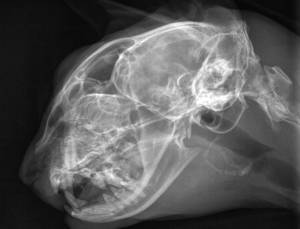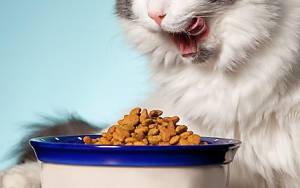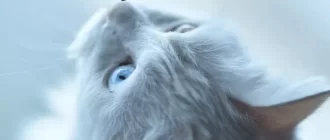Head pressing is an unusual action observed in cats that may cause concern among their owners. This behavior is not merely an adorable quirk, but rather a possible indication of significant health problems.
Head pressing in cats refers to the repetitive act of a cat forcefuilly pressing its head against solid surfaces like walls. This behavior should not be confused with the regular head butting or bunting, as the latter is a way for cats to communicate and establish their territory.
Causes of Head Pressing in Cats
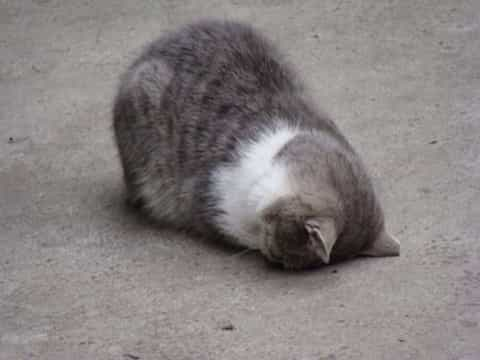
There are various reasons why a cat may engage in head pressing, such as being exposed to toxins or having disorders related to metabolism or the nervous system, like brain tumors. If you notice your cat displaying this behavior, it is extremely important to consult a veterinarian right away. The earlier the underlying problem is identified, the higher the likelihood of a positive treatment outcome.
Symptoms and Signs
It is important for cat owners to be familiar with the condition known as head pressing in cats. This behavior, which may be mistakenly perceived as adorable, can actually indicate significant neurological issues.
Recognizing Head Pressing in Cats
When a cat presses its head against a wall or other hard objects for no apparent reason, it’s a clear sign of head pressing. This behavior is different from the usual head butting that cats do to show affection. It’s more intense and prolonged, and the cat seems to be in a state of discomfort or distress.
Other related symptoms and signs
Head pressing can be accompanied by additional signs such as altered behavior, seizures, vision issues, or repetitive movements. If you observe any of these indicators, it is essential to seek immediate veterinary assistance. Detecting and treating the condition early can greatly impact the well-being of your beloved pet.
Here’s a quick table summarizing the symptoms:
| Symptom | Explanation |
|---|---|
| Head Pressing | The cat inexplicably pushes its head against a wall or any solid surface, which is distinct from the usual head butting behavior displayed by cats when they want to display affection. |
| Other Symptoms | Head pressing can be accompanied by changes in learned behavior, seizures, vision issues, as well as pacing and circling. It is essential to promptly consult a veterinarian if any of these signs are observed. |
Underlying Medical Conditions
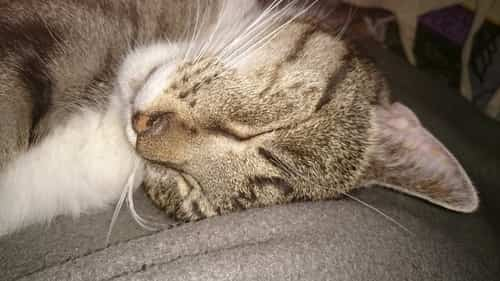
Head pressing in cats is not a normal behavior and could be an indication of serious underlying medical conditions.
Possible Medical Conditions associated with Head Pressing in Cats
When you notice your feline companion pressing its head against the wall or other objects, it could be a sign of several health issues. These include liver shunt, metabolic disorders, or even tumors. It’s crucial to seek immediate veterinary attention to diagnose and treat the root cause of this unusual behavior.
Neurological Disorders and Head Pressing
In some cases, head pressing can be attributed to neurological disorders like prosencephalon disease. This condition affects the forebrain and thalamus parts of the cat’s brain, leading to abnormal behaviors such as head pressing. Therefore, it’s essential to keep an eye on your pet’s behavior and consult with a vet if you notice any changes.
Here’s a table summarizing potential causes of head pressing in cats:
| Potential Cause | Explanation |
|---|---|
| Liver Shunt | A condition where the cat’s liver isn’t properly detoxifying the blood. |
| Metabolic Disorders | These disorders can cause a buildup of toxins in the cat’s system, leading to head pressing. |
| Tumors | Abnormal growths in the brain can cause pressure leading to head pressing. |
| Prosencephalon Disease | This neurological disorder affects the forebrain and thalamus, causing abnormal behaviors like head pressing. |
Diagnostic Procedures
Head pressing in cats is a grave matter that necessitates urgent action. It is a conduct that signifies hidden neurological issues and should not be disregarded.
In order to determine the cause of the head pressing behavior, veterinarians may carry out several tests. These may involve examining blood and urine samples, using imaging techniques such as MRI or CT scans, and potentially analyzing cerebrospinal fluid (CSF). These tests are helpful in identifying the underlying cause of the head pressing behavior.
Consulting a Veterinarian
If you notice your feline friend exhibiting head pressing behavior, it’s crucial to consult with a veterinarian promptly. They can provide a diagnosis and recommend appropriate treatment options to ensure your pet’s health and well-being.
Treatment Options
Head pressing in cats is a serious condition that requires immediate veterinary attention. It’s essential to understand that the treatment for this condition largely depends on the underlying cause.
Treating Head Pressing in Cats
The first step is a thorough diagnosis. Veterinarians may employ different diagnostic tools like blood tests, MRIs, or CT scans to determine the root cause. Once identified, a treatment plan can be formulated.
Medications and Therapies
Medication is often used to manage symptoms and treat the underlying cause. For instance, if a brain tumor is causing the head pressing, chemotherapy or radiation therapy may be recommended. In some cases, surgical intervention might be necessary.
Remember, early detection and treatment can significantly improve the prognosis for cats suffering from head pressing.
When to Seek Veterinary Care
Head pressing in cats can be a serious concern for pet owners. It’s not a behavior to ignore.
Recognizing the Severity of Head Pressing in Cats
If you notice your cat pressing its head against walls, furniture, or other objects for no apparent reason, it’s time to consult a vet. This unusual behavior could be a sign of various underlying health issues such as metabolic disorders, tumors, or neurological conditions like encephalitis.
Immediate veterinary attention is crucial to diagnose and treat the underlying cause effectively. Remember, early intervention can make a significant difference in your cat’s health and quality of life.
Prognosis and Recovery
Head Pressing in Cats is a serious condition that requires immediate veterinary attention. The prognosis and recovery largely depend on the underlying cause. Some conditions, like liver disease or brain tumors, may have a less favorable prognosis. However, with early detection and appropriate treatment, many cats can recover fully.
For cats diagnosed with head pressing, long-term management is often necessary. This could involve regular vet check-ups, medication to control symptoms, and dietary changes to support overall health. It’s also crucial to create a stress-free environment for your feline friend. Remember, the goal is to provide the best possible quality of life for your cat while managing the underlying condition causing head pressing.
In conclusion, head pressing in cats is a serious symptom that requires prompt veterinary care. With proper management and care, cats can lead a comfortable life despite their condition.
